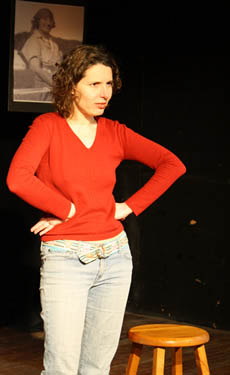
Robyn Israel brings her one-woman show, "Jewish Girls Don't Kayak," to the Arts Project.
by Tess de Haan
Robyn Israel is a woman of many talents and even more energy. She is reviving her revamped one-woman show, “Jewish Girls Don’t Kayak,” at The Arts Project this month.
“Jewish Girls Don’t Kayak” premiered at London’s 2007 Fringe Festival and went on to win a Brickenden Award for Best Comedy Show of the Year. The show addresses themes of multiculturalism, anti-Semitism, Judaism, and identity issues. Although that may not read like a comedy show, Israel gives the material a lighthearted treatment.
Humour is the backbone of the show, and Israel feels that comedy is what makes the message stick. Her aim is to educate people who may not know about Judaism – to dispel the stereotypes and entertain at the same time. “It’s palatable because it educates in a lighthearted way,” says Israel.
The show’s title was derived from a conversation Israel had with a man who, upon learning that she kayaked, declared, “Jewish girls don’t kayak!” “I thought it was such an absurd comment and I filed it away in my mind,” laughs Israel. “I thought it would be a catchy title for a play someday and voila! My play addresses stereotypes like his comment.”
In treating what is very personal and often painful material in a comedic way, Israel is following a Jewish tradition in itself. “What sets them [Jewish immigrants] apart, I think,” Israel explains, “is their wonderful sense of humor and their appreciation for the absurd. Jewish people love to laugh, love to tell jokes and enjoy word play, which is a big part of my play.”
“Like many immigrants, the Jews came to Canada in search of a better life, free from the persecution that had plagued them in Europe,” Israel says. “They stuck together and built cohesive communities. They still had to contend with anti-Semitism, even in their adopted country [unlike some other immigrant groups]. This is sadly true even today.” As an example, she cites overhearing an anti-Semitic comment the same day her show opened at the Fringe.
Israel came to acting relatively recently, after being introduced to improvisational theatre. She was working in Palo Alto, CA, as a theatre writer and was assigned a story about an improv troupe. “It sparked something in me,” recalls Israel. “They were having so much fun!”
Although Israel was an arts journalist, writing regularly, she still felt a void in terms of personal creativity. So in 2002, she began taking improv classes and soon after began writing her first one-woman show, “My Mother, God Love Her.” Israel performed this show at the Marsh Theatre in San Francisco in 2004.
Although the San Francisco show, as well as “Jewish Girls Don’t Kayak,” is based on real events and people from her life, Israel does admit to taking creative license. But still, I wonder, isn’t it personally risky to perform a show based on your own life, complete with boyfriend stories, mother stories, and adolescence stories? “Yes, absolutely”, Israel agrees. “But I really think we learn from other people’s lives, experiences and insecurities. My story is unique to me and yet it’s so universal in its narrative. It reaches out to all cultures, and I know I connected with people from different backgrounds by sharing my life story.”
The Fringe version of “Jewish Girls” clocked in at 45 minutes, but in the last two years Israel has expanded and broadened the scope of the show to make it a full-length production.
“I felt like the story was still being written,” says Israel, as more recent events in her life made their way into the narrative. “I view the Fringe as a workshop. This time I wanted to stage it in a more mainstream venue; take it to a higher level. That was my goal from the start.”
While Victoria Sutton directed the Fringe version, this time around Peter Busby is at the helm.
“Peter gave me my first break in London theatre,” says Israel, who credits her move to London as an important factor in her artistic development. “London’s been kind to me,” she says. “The London Arts Council has been a great source of support. They really believed in my growth as an artist. I owe a lot to them.”
“Jewish Girls Don’t Kayak” runs March 24 to 28 at The Arts Project, 203 Dundas Street. For more information visit the Arts Calendar.
Tess de Haan is busy working on her one-woman show “Dutch Girls Don’t Rawk”! Because of course, she says, they do.

